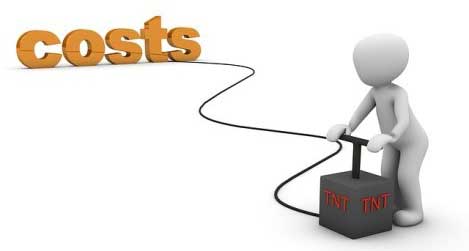You should avoid these mistakes when calculating the projected rental returns on an investment and should also be on the lookout for anyone else who is making these mistakes when they sell you a property purportedly a great investment.

Using Estimates Instead of Actual Numbers. There are actually three different ways I see people using estimations when trying to project returns on an investment property.
Related - How to Calculate ROI on Rental Property
The 50% or X% rule
I know some people, maybe due to their busy schedule follow this 50 or X % rule i.e. 50% or X% of the rent you collect from a property will go towards expenses.
Technically the “rule” should have been labelled “the 50% or X% guideline.” It should absolutely only be used as a guideline when you initially glance at a potential property. This is because you could be setting yourself up for a major loss when you find out how much the actual numbers on the expenses may differ from one to the other. So much for that 50% or X% safety net!
Some people also a rule for rental returns at 5% for any properties they invest. However the said rule may not work when prices have been rising over the years. Rental returns of 5% may be considered good 10 years ago may not be good now. These rental returns guideline may have to be reviewed from time to time.
Never decide on a property solely because it meets the 50% rule or X% rule. Use it only as a guideline (or if you’re like me, don’t use it at all) and then drop it.

Calculating expenses

It is common to hear someone when evaluating a property to buy and they share the numbers associated with that property and they say things like “maintenance is usually around RM150/month”, “the taxes should be about RM100/month”, “I should be able to get RM600/month in rent”, “I think it will be about RM5,000 for the reno”…
Never use an estimate when you can use an actual!
Projecting and speculating
Planning on raising the rent on your rental property by 3% in the next year is crazy. Guess what, you don’t get to choose when you raise the rents.
Raising rent on a property is not done just because you want it to. It’s done when the market supports it especially for residential property. You can try to increase the rents but if that puts your rent over market rent, who will want to rent your house? No one, because they can rent a different property for cheaper (market rent).
However there are exception to the said for example a business in operation with long term lease for a building, factory etc Even in such situation when the market is bad and if the good tenant’s business is facing difficulty during downturn you may have to waive off the increase in rent for the downturn period.
Is Numbers Everything?
Guess what, they’re not. Yes, numbers are critical in evaluating a property and they are really the only non-negotiable of all the factors that go into what makes for a good rental property. They are not, however, everything. I’ve mentioned a couple times these other “factors”, well what are they?

Keep in mind these points below have room for maneuvering.
Location.
Is it in a growth market? Is the population there on the rise or declining?
Is the area safe? How are the schools? What kind of tenants will want to live there?
Property condition.
What is the age of the property?
Does it need any rehabbing? If so, what? What kind of tenants will want to live there?
Property management.
Is there access to a good property manager to manage the property?
Even if that is you because you plan to landlord it yourself, are you available to handle it?
Demand for the property in the said area or project? Is the vacancy low and supply limited?
There may be others that can be added to this list. The most important question of those, in my opinion, is what kind of tenants will want to live there? It comes down to “quality” of a property. Quality of the market, quality of the property, quality of the management. If any of those are lacking, you may hit some trouble.
Remember though, those numbers are only what is written on paper. They are not a sure thing. As soon as you get in a position of having bad tenants (especially if on a consistent basis) and an older property needing repairs, those phenomenal returns you projected could easily end up being more realistically much lower than you projected, if not even negative.
Numbers themselves are non-negotiable, but once you find a property whose numbers work, you must assess the viability of those numbers based on other pointers above too instead of buying a property based on what the agent thinks is good.
「If this article is useful to you, feel free to buy me a coffee ☕」
If this article is useful to you, feel free to buy me a coffee ☕
